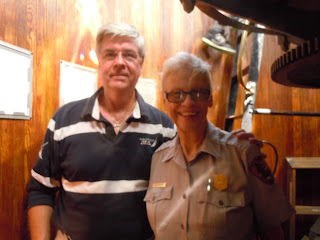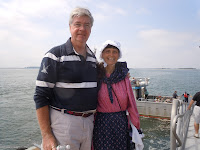~*~*~*~*~*~*~*~*~*~*~*~

This three-hour adventure
began with a forty-five minute narrated tour on a comfortable vessel through
the Boston Harbor Islands, where I had the chance to experience the rich
maritime history of the islands with a park ranger as a guide.
*~*~*
 |
| Graves Light |
 My adventure started with a boat ride to Little
Brewster Island, leaving from Boston and voyaging through the Harbor Islands
national park area. A narrated tour
given by a Nation Park Service Ranger along the way chronicled the maritime
traditions of Boston Harbor and island life, past and present. Views of the park’s three lighthouses: Graves
Light, Long Island Head Light, and Boston Light were all pointed out to
us.
My adventure started with a boat ride to Little
Brewster Island, leaving from Boston and voyaging through the Harbor Islands
national park area. A narrated tour
given by a Nation Park Service Ranger along the way chronicled the maritime
traditions of Boston Harbor and island life, past and present. Views of the park’s three lighthouses: Graves
Light, Long Island Head Light, and Boston Light were all pointed out to
us.
*~*~*
 During this unforgettable adventure tour of
Boston Light I found myself stepping directly off the boat into the past.
During this unforgettable adventure tour of
Boston Light I found myself stepping directly off the boat into the past. ~*~*~*~*~*~
 Historic Little Brewster Island is located in
the outer reaches of Boston Harbor providing unique views of the city and the
surrounding waterways.
Historic Little Brewster Island is located in
the outer reaches of Boston Harbor providing unique views of the city and the
surrounding waterways.
~*~*~*~*~*~*~*~*~*~*~*~*~*~*~*~*~
Established in 1716, the Boston Light is the
first and oldest lighthouse station in the United States.
During the American Revolution, Boston Light
was damaged by attacks of patriot militia, and later destroyed by British troops
as they left Boston Harbor.
~*~*~*~
The current
tower was built in 1783 and is the last light station in the country to be
staffed by a US Coast Guard light keeper.
*~*~*~*~*~*~*~*~*
~*~ SALLY ~*~
Boston Light Keeper.
~*~*~*~*~*~*~*~*~*~*~*~*~*~*~*~*~*~*~*~*~*~*~*~
 |
| Sally gives us some 'safety tips' to know while on the island, and explains a bit of lighthouse history. |
Our tour of Little Brewster Island included
meeting the extremely informative US Coast Guard light keeper, Sally, who
explained life on the island in detail.
~*~
We viewed the light station structures on the island:
The Keepers house,
the cistern and oil house and a small museum located at the base of Boston Light.
 |
| This is a photo of the showcase displaying various aids to navigation artifacts. In the center is a 5th Order Fresnel Lens. |
Then I had the chance of a lifetime...
...to climb the
76 steps (and two ladders)
up to the top of the tower!
*~*~*~*
.... there is still more to climb...
for a close up look at
Boston Light’s Fresnel lens.
*
 |
| Once having reached the 76th step of the spiral staircase, a vertical ladder provides access to a small windowless room where the gear mechanism that rotates the Fresnel lens is housed. |
 |
| brass wheels that the lens turns on. |
 |
| A look up from the gear works to the lens above. |
The Fresnel lens is rotated to provide a flash every 10 seconds by a mechanism that involves the rolling of eight 'chariot' or truck wheels that are six inches in diameter rotating the 4,000 pound Fresnel lens. Before electrification in 1948, a clock-works mechanism was wound every four hours by the Keeper.
Finally we make it to the top!
 Augustin Fresnel was a French engineer who developed the technology of the dioptric prisms for refracting light from a light source such as oil lamps, using hundreds of prisms to magnify the light source, providing a superior beam of light .The bulls-eyes of the Fresnel Lens create 12 individual beams.
Augustin Fresnel was a French engineer who developed the technology of the dioptric prisms for refracting light from a light source such as oil lamps, using hundreds of prisms to magnify the light source, providing a superior beam of light .The bulls-eyes of the Fresnel Lens create 12 individual beams.
The Fresnel Lens apparatus consists of polyzonal lens enclosing the lamp, which is placed at the central focus. The lens is built up on glass prisms in panels, the central portions of which are dioptric, or refracting only, and the upper and lower portions are both reflecting and refracting, which is called catadioptric. There is no way to replicate these glass prisms. The specifications for making them were lost during the invasion of France in World War II
But you knew all that !
*~*~*
The Coast Guard and the National Park Service are committed to keeping Boston Light's second order Fresnel lens with its chariot wheels and gear system operable for visitors to observe. It is one of the few existing "working" classic lenses operable in this country.
*~*~*~
Boston Light was built in 1783, after the original structure was destroyed during the Revolutionary War by the British. The tower is constructed of rubble stone and is 89 feet tall with a focal point of 102 feet above sea level. The beam of white light flashes ever 10 seconds and can be seen for 27 miles on a clear night.
*~*~*~
After enjoying the spectacular views atop the tower,
it was now time to start the climb down.
*~*~*~*~*~*
After a short rest, we said goodbye to Sally and headed back into Boston.
WAIT, our day isn't over yet !
 |
| Back on the mainland ... * a (late) LUNCH is in order *** Delicious ! *** |
Now it's time to head home.
*
*
I had a great time 'adventure touring' with my friend Jane. So nice to see Boston,
*
I had a great time 'adventure touring' with my friend Jane. So nice to see Boston,
my home town through her eyes !


























i am trying this again. let's see if comments come this time. i think my only comment was that sally is the FIRST woman light keeper although plenty of women were defacto light keepers on behalf of their husbands. only i wrote more i'm sure, and better. ;-)
ReplyDeleteWonderful pictures and interesting narration about your trip.
ReplyDeleteI loved the angles you used on the Fresnel lens and the staircase. Keep up the good work ! Anne MacDonald